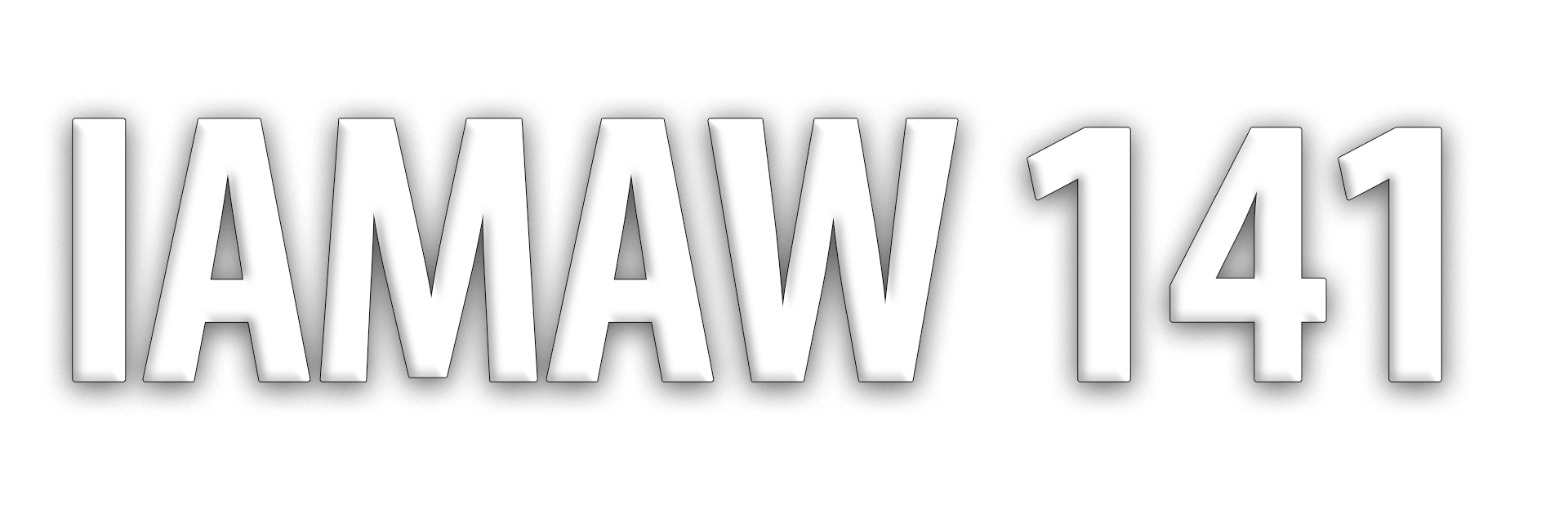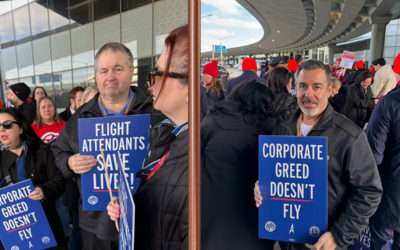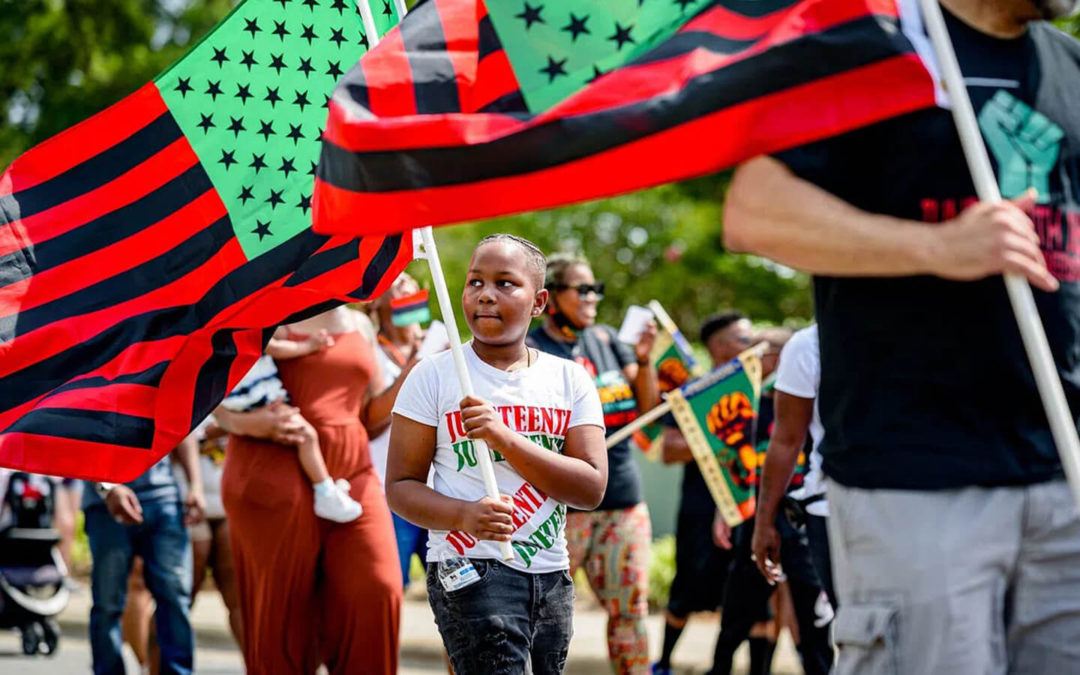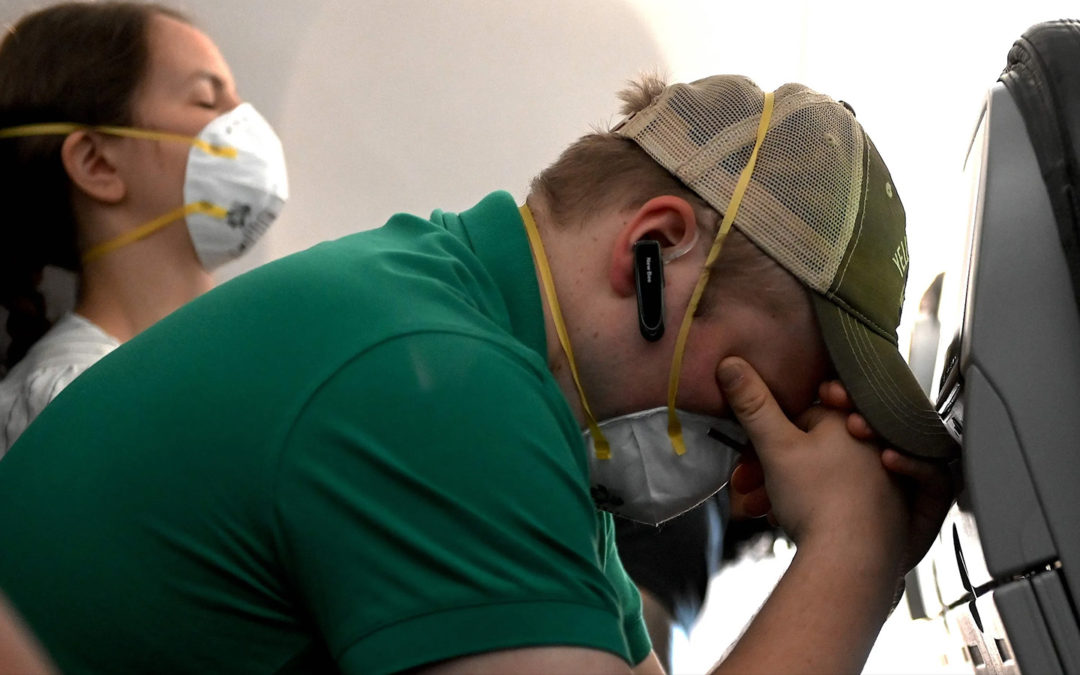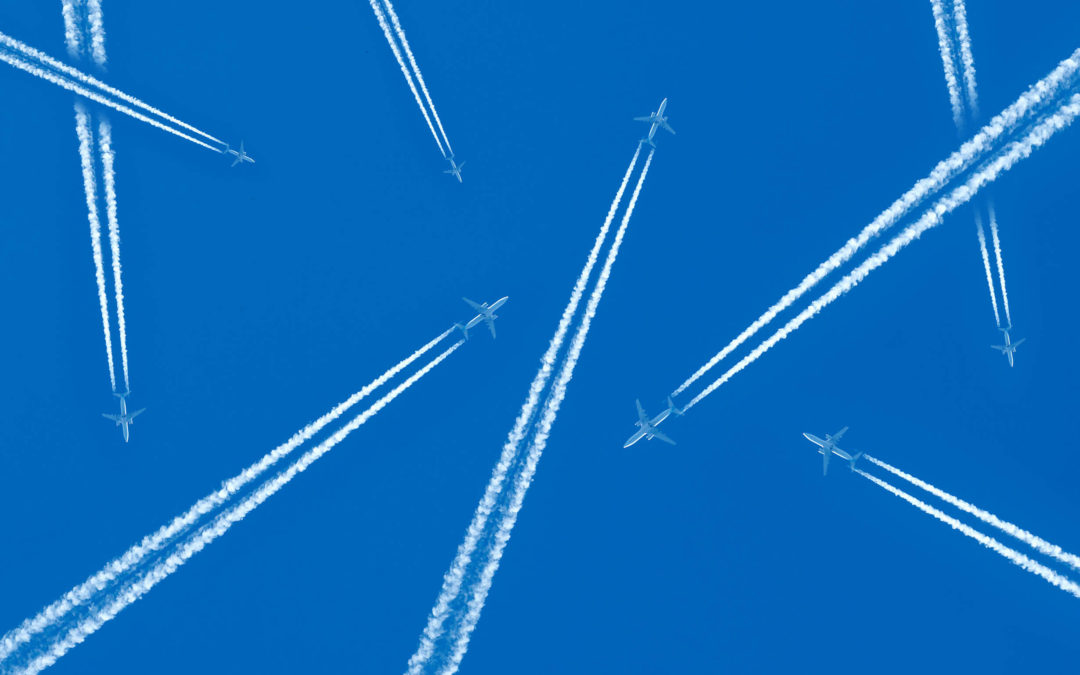Machinists Union Stands in Solidarity with Flight Attendants in Nationwide Day of ActionPictured: Assistant General Chairs Erik Stenberg (left) and Mike Cyscon.In a display of solidarity, members of the Machinists Union joined flight attendants in nationwide rallies...
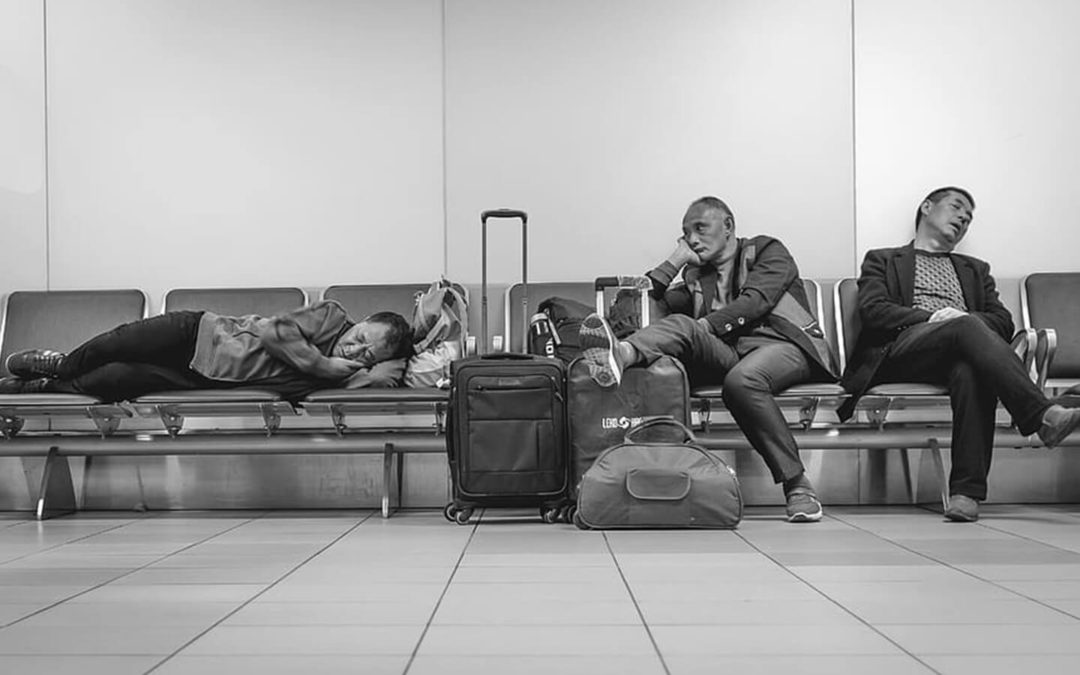
The Perfect Storm: How Weather and Staffing Woes Are Disrupting US Airlines

The Perfect Storm: How Weather and Staffing Woes Are Disrupting US Airlines
The past week saw a surge of US airline passengers left high and dry as extreme weather caused a multitude of grounded planes and flight cancellations. However, the weather was only a part of the larger issue causing the travel disruption.
There is a glaring scarcity of staff across US airlines and the Federal Aviation Administration’s air traffic control operations, escalating the already difficult circumstances.
The state of affairs saw a slight improvement on Wednesday at US airports. The FlightAware tracking service reported that about 800 flights were canceled, and an additional 1,400 were delayed by midday ET. Stormy weather around Boston caused an early morning ground stop on Wednesday, holding aircraft bound for Logan Airport at the gate or on the tarmac at various national airports.
Although this shows some progress compared to the 2,200 flights canceled on each of the two previous days and more than 16,000 delayed flights between Monday and Tuesday, the operation is far from running smoothly.
Staffing Issues
One of the key reasons why the US air travel system cannot recover rapidly from widespread weather disruptions is the need for more staff to manage these interruptions.
Despite a substantial injection of $54 billion of taxpayer money into airlines during the pandemic, many airlines considerably scaled back staff during the initial pandemic year when air travel and fares declined. They offered buyouts and early retirement packages, though involuntary layoffs were prohibited. Several airlines also permanently retired older, less efficient planes. The rehiring of staff has proved slower than airlines had promised.
Domestic US airline capacity, calculated by the number of available seats adjusted for miles flown, is still down 10% in the current quarter compared to Q2 2019, before the pandemic, according to data from Cirium, an aviation analytics company.
Additionally, finding available seats for passengers on canceled flights becomes a significant problem, particularly during peak travel periods.
The Transportation Security Administration predicts that this coming Friday, the beginning of the four-day July Fourth weekend will be the busiest air travel day since the pandemic began.
In an interview published by CBS News, Delta CEO Ed Bastian noted that the current situation has improved from last year. However, he conceded to investors that his airline “still [is] not running as optimally as it needs to run. We have improvements we can make. Substantial improvements, over where we were last summer.”
FAA Difficulties
In the same CBS News report, United’s CEO partly largely blamed the FAA for his failure to staff and organize the airline. The FAA, he argued, limited the flight frequency to and from major urban areas such as the three airports in and around New York City. United bore the brunt of the cancellations and delays, mostly centered at its’ hub in Newark.
United Airlines CEO Scott Kirby expressed his dissatisfaction with the FAA in an internal company memo, stating, “The FAA frankly failed us this weekend,” a sentiment he shared with CBS News. Over the weekend, the airline had to cancel 461 flights and postpone 1,972 flights, as per FlightAware data.
In the CBS interview, Kirby claimed that on Saturday, the FAA reduced the arrival and departure rates at its sprawling Newark Liberty International Airport hub by 40% and 75%, respectively. “And that put everyone behind the eight ball when weather actually did hit on Sunday and was further compounded by FAA staffing shortages Sunday evening.”
Kirby, who depends on the goodwill of Federal regulators for authorizations and clearances critical to the airline, was careful to stop short of appearing to cast blame on FAA Leadership.
In response to Kirby’s criticism, an FAA spokesperson responded by saying they are always willing to collaborate with anyone seriously committed to solving a problem.
Transportation Secretary Pete Buttigieg, at an unrelated event in South Carolina on Wednesday, shared his thoughts on the situation. He affirmed that conditions have improved compared to last year but acknowledged the need for further progress. He applauded the airlines for their efforts and identified the weather as a significant contributor to the current issues. He refrained from commenting specifically on United’s concerns about the problems caused by the FAA and its air traffic control system.
In the CBS News report, Buttigieg stated, “Anything under our control at the FAA we’re going to be working on and anything under the airlines’ control, they need to step up and take responsibility.” He relayed his travel difficulties to South Carolina, including one cancellation and one delay, which resulted in his arrival being postponed to 2:30 am. He expressed empathy for the plight of many Americans undergoing similar experiences.
In Houstons’ Bush Intercontinental Airport (IAH), hundreds of stranded passengers were stranded overnight on Monday, many of whom were forced to sleep in communal rows on the airport floor. The passengers, most of whom were traveling on United, did not have access to restaurants or food. Water was only available via water fountains, and only two restrooms were available.
The storms or staffing shortages did not directly impact Bush Airport but were still the victim of cascading failures elsewhere in the system. One ramp employee said that none of the early morning “Head Start” flights, which the airline tries to send out early if possible, had departed on time for the past three days.
Union Intervention is Needed
However, one of the major unions at United, the Association of Flight Attendants, pointed out that the issue extended well beyond the FAA and included the airline’s management.
According to a memo shared with media outlets, the union expressed their mounting frustration, pointing out a long list of seemingly endless problems, particularly for those working extended hours. The memo, sent to members on Monday, highlighted extensive wait times with company crew schedulers, indicating problems beyond air traffic control staffing shortages.
When questioned about the flight attendants’ complaints, United responded that “making sure our flight attendants can reach us quickly is a top priority. We have deployed all available resources to catch up on call volume, including increasing staffing in crew scheduling and mandatory overtime on the scheduling team. We also have ways flight attendants can check in electronically for trips and schedule changes.”
Related News
Machinists Union Stands in Solidarity with Flight Attendants in Nationwide Day of Action
February Helping Hands: Financial Health
EAP Peers: February is often a month that people are struggling with finances after the holidays. We focus on a government agency that has some terrific resources - the Consumer Finance Protection Bureau. This agency has a myriad of resources to help with any...
$8,000 in Scholarships are Now Available!
$8,000 in Scholarships are Now Available!District Lodge 141 is excited to announce the commencement of its 2024 Adolph Stutz Memorial Scholarship Essay Contest!$8,000 in Scholarships are Now Available!IAM141.org 6 February 2024District Lodge 141 is excited to announce...
Stay up to date with all the latest news and information from the Machinists Union

The Perfect Storm: How Weather and Staffing Woes Are Disrupting US Airlines
June 28, 2023
The past week saw a surge of US airline passengers left high and dry as extreme weather caused a multitude of grounded planes and flight cancellations. However, the weather was only a part of the larger issue causing the travel disruption.
There is a glaring scarcity of staff across US airlines and the Federal Aviation Administration’s air traffic control operations, escalating the already difficult circumstances.
The state of affairs saw a slight improvement on Wednesday at US airports. The FlightAware tracking service reported that about 800 flights were canceled, and an additional 1,400 were delayed by midday ET. Stormy weather around Boston caused an early morning ground stop on Wednesday, holding aircraft bound for Logan Airport at the gate or on the tarmac at various national airports.
Although this shows some progress compared to the 2,200 flights canceled on each of the two previous days and more than 16,000 delayed flights between Monday and Tuesday, the operation is far from running smoothly.
Staffing Issues
One of the key reasons why the US air travel system cannot recover rapidly from widespread weather disruptions is the need for more staff to manage these interruptions.
Despite a substantial injection of $54 billion of taxpayer money into airlines during the pandemic, many airlines considerably scaled back staff during the initial pandemic year when air travel and fares declined. They offered buyouts and early retirement packages, though involuntary layoffs were prohibited. Several airlines also permanently retired older, less efficient planes. The rehiring of staff has proved slower than airlines had promised.
Domestic US airline capacity, calculated by the number of available seats adjusted for miles flown, is still down 10% in the current quarter compared to Q2 2019, before the pandemic, according to data from Cirium, an aviation analytics company.
Additionally, finding available seats for passengers on canceled flights becomes a significant problem, particularly during peak travel periods.
The Transportation Security Administration predicts that this coming Friday, the beginning of the four-day July Fourth weekend will be the busiest air travel day since the pandemic began.
In an interview published by CBS News, Delta CEO Ed Bastian noted that the current situation has improved from last year. However, he conceded to investors that his airline “still [is] not running as optimally as it needs to run. We have improvements we can make. Substantial improvements, over where we were last summer.”
FAA Difficulties
In the same CBS News report, United’s CEO partly largely blamed the FAA for his failure to staff and organize the airline. The FAA, he argued, limited the flight frequency to and from major urban areas such as the three airports in and around New York City. United bore the brunt of the cancellations and delays, mostly centered at its’ hub in Newark.
United Airlines CEO Scott Kirby expressed his dissatisfaction with the FAA in an internal company memo, stating, “The FAA frankly failed us this weekend,” a sentiment he shared with CBS News. Over the weekend, the airline had to cancel 461 flights and postpone 1,972 flights, as per FlightAware data.
In the CBS interview, Kirby claimed that on Saturday, the FAA reduced the arrival and departure rates at its sprawling Newark Liberty International Airport hub by 40% and 75%, respectively. “And that put everyone behind the eight ball when weather actually did hit on Sunday and was further compounded by FAA staffing shortages Sunday evening.”
Kirby, who depends on the goodwill of Federal regulators for authorizations and clearances critical to the airline, was careful to stop short of appearing to cast blame on FAA Leadership.
In response to Kirby’s criticism, an FAA spokesperson responded by saying they are always willing to collaborate with anyone seriously committed to solving a problem.
Transportation Secretary Pete Buttigieg, at an unrelated event in South Carolina on Wednesday, shared his thoughts on the situation. He affirmed that conditions have improved compared to last year but acknowledged the need for further progress. He applauded the airlines for their efforts and identified the weather as a significant contributor to the current issues. He refrained from commenting specifically on United’s concerns about the problems caused by the FAA and its air traffic control system.
In the CBS News report, Buttigieg stated, “Anything under our control at the FAA we’re going to be working on and anything under the airlines’ control, they need to step up and take responsibility.” He relayed his travel difficulties to South Carolina, including one cancellation and one delay, which resulted in his arrival being postponed to 2:30 am. He expressed empathy for the plight of many Americans undergoing similar experiences.
In Houstons’ Bush Intercontinental Airport (IAH), hundreds of stranded passengers were stranded overnight on Monday, many of whom were forced to sleep in communal rows on the airport floor. The passengers, most of whom were traveling on United, did not have access to restaurants or food. Water was only available via water fountains, and only two restrooms were available.
The storms or staffing shortages did not directly impact Bush Airport but were still the victim of cascading failures elsewhere in the system. One ramp employee said that none of the early morning “Head Start” flights, which the airline tries to send out early if possible, had departed on time for the past three days.
Union Intervention is Needed
However, one of the major unions at United, the Association of Flight Attendants, pointed out that the issue extended well beyond the FAA and included the airline’s management.
According to a memo shared with media outlets, the union expressed their mounting frustration, pointing out a long list of seemingly endless problems, particularly for those working extended hours. The memo, sent to members on Monday, highlighted extensive wait times with company crew schedulers, indicating problems beyond air traffic control staffing shortages.
When questioned about the flight attendants’ complaints, United responded that “making sure our flight attendants can reach us quickly is a top priority. We have deployed all available resources to catch up on call volume, including increasing staffing in crew scheduling and mandatory overtime on the scheduling team. We also have ways flight attendants can check in electronically for trips and schedule changes.”
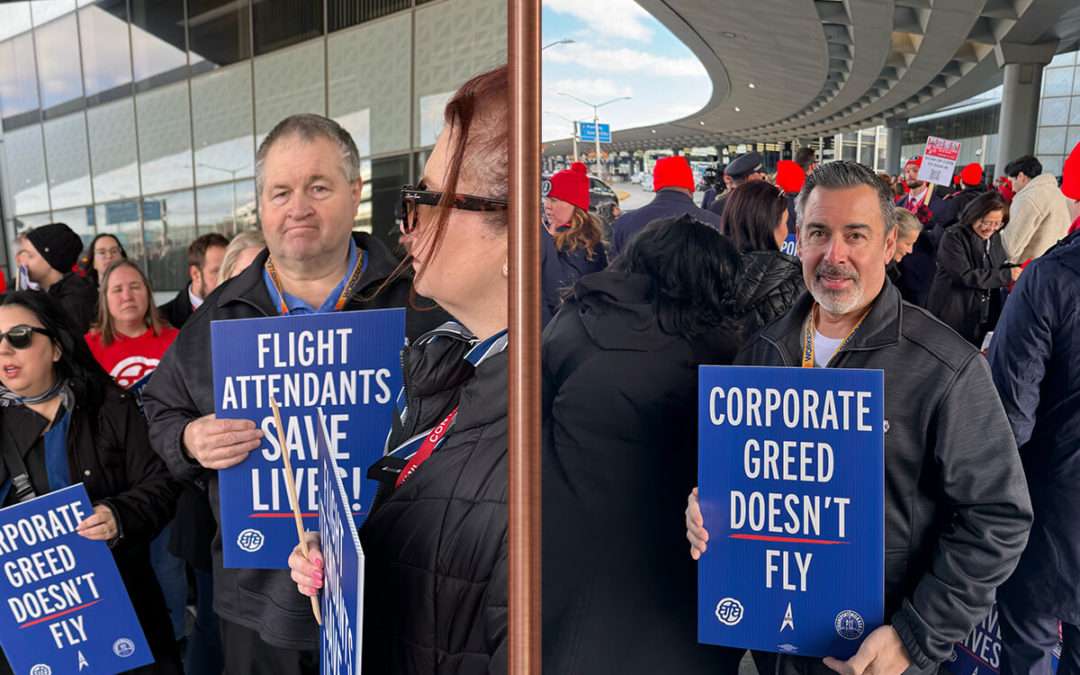
Machinists Union Stands in Solidarity with Flight Attendants in Nationwide Day of Action
Machinists Union Stands in Solidarity with Flight Attendants in Nationwide Day of ActionPictured: Assistant General Chairs Erik Stenberg (left) and Mike Cyscon.In a display of solidarity, members of the Machinists Union joined flight attendants in nationwide rallies...

February Helping Hands: Financial Health
EAP Peers: February is often a month that people are struggling with finances after the holidays. We focus on a government agency that has some terrific resources - the Consumer Finance Protection Bureau. This agency has a myriad of resources to help with any...

$8,000 in Scholarships are Now Available!
$8,000 in Scholarships are Now Available!District Lodge 141 is excited to announce the commencement of its 2024 Adolph Stutz Memorial Scholarship Essay Contest!$8,000 in Scholarships are Now Available!IAM141.org 6 February 2024District Lodge 141 is excited to announce...
